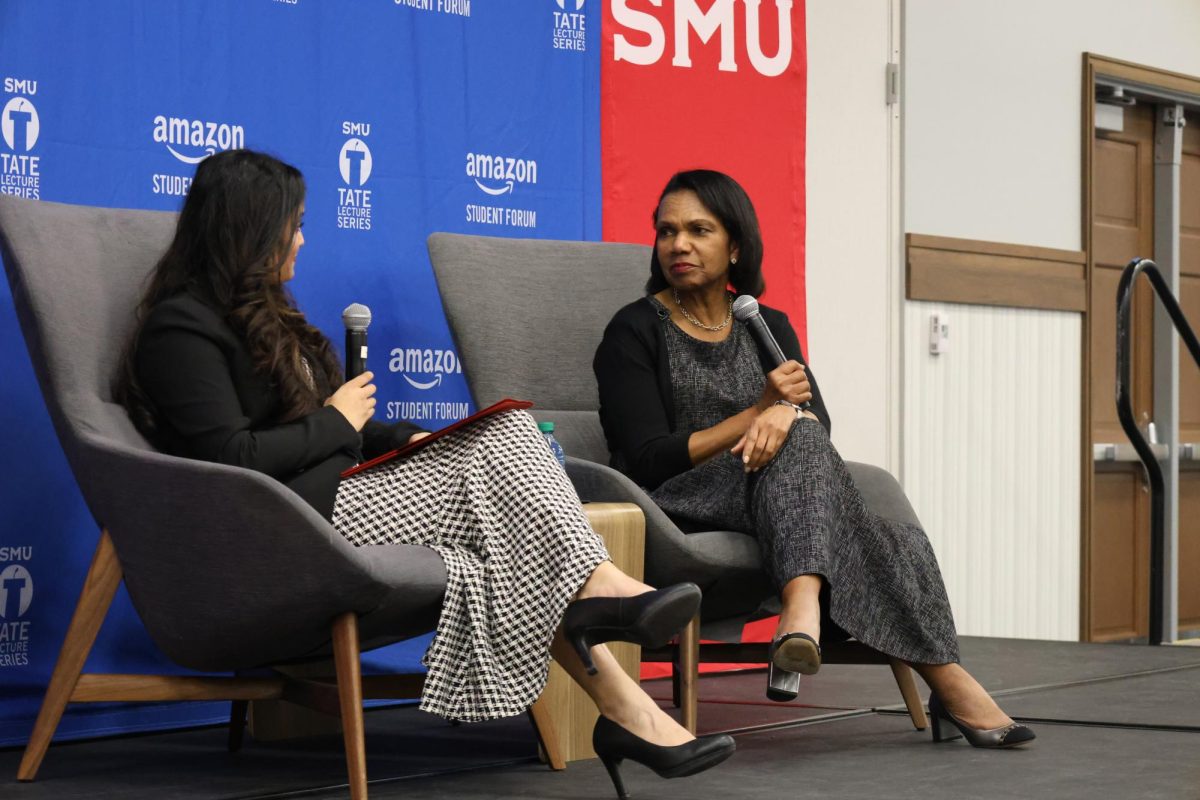On Tuesday, March 27, former Secretary of State Condoleezza Rice came to SMU as the Tate Lecture speaker. Rice is the director and senior fellow at the Hoover Institution, a professor in global business and economics at Stanford’s Graduate School of Business and served in both George H.W. Bush and George W. Bush’s administrations.
Before the lecture, Rice spoke with students during the Amazon Student Forum, discussing her childhood, becoming Secretary of State and her knowledge and background on Russian affairs. During the forum, students asked Rice questions about her career.
Q: Your journey from segregated Birmingham to the White House is one of resilience and determination. When did you first realize that you have the power to influence the world around you?
Rice: What’s resilient is that I started college as a piano performance major and realized I didn’t quite have that talent, and then had to find something to do with my life. I grew up in Birmingham, Alabama. We left Birmingham, I was just about to be 12, and moved to Denver. My parents were educators. The expectation was always, ‘faith, family and education.’ I grew up in a family that was very devoted to education.
I started playing the piano when I was three. I was absolutely certain I was gonna play Carnegie Hall. When I went to the Aspen Music Festival school the summer after my sophomore year in college, I met twelve-year-olds who could play from sight, which had taken me all year to learn, so I decided to make a change. Fortunately, I wandered into a course on international politics. I knew then what I wanted to be, I didn’t know what exactly, but I knew it would be something in international diplomacy. That’s a little bit of my reckoning with the gap between music and politics.
Q: You often said that life is not a straight road. Can you share a moment with us when you faced a major setback?
Rice: I’m an only child and my parents really invested a lot in my music career. When I came home and I said ‘Mom and dad, I’m changing my major,’ and they said, ‘What are you changing it to?’ I said, ‘I don’t know.’ They said, ‘You don’t know what you wanna do with your life?’ I said, ‘It’s my life.’ They said, ‘It’s our money.’ I went through several iterations of that.
I often tell my students at Stanford this because life isn’t a straight line. Had I decided or not decided that music was not my calling— it might have been my calling, it wasn’t my talent.
Q: Speaking of George Bush, we all know that you two have had a lot of experience working together. What made your working relationship so effective, and what was a pivotal moment where you both had to lean on each other?
Rice: The thing that makes any relationship work, especially under the hot lights of Washington, is trust. I knew that he trusted me and I trusted him. We had been through the campaign together and the ups and downs of that. We’d been through Bush v. Gore, and we did not realize that we’d won the election for a couple of months after the election. We developed a relationship with trust.
We also developed a relationship in which I felt I could go into the Oval Office and tell him the truth, but that he was never gonna read about it in the Washington Post or the New York Times, because we were going to trust that whatever we said was between us.
Then finally, that really kind of reached its height, through the wars of Sept. 11, having to go through the first attack on American territory since the War of 1812. Going in every day, wondering what was gonna jump out that day. Terrorist threat reporting was just terrifying most of the time. Little by little, you kind of forge a bond around difficulties like that and I think it carried us through. He remains a very good friend.
Q: You were the first African American woman to serve as Secretary of State. What advice do you have for young women who are minorities who are stepping into these leadership roles, who may be the first or only one?
Rice: Acknowledge it, honor it, be grateful to those who came before and then forget about it. You don’t have time to be the African American Secretary of State, you better be the Secretary of State. You better be good at it. Everything else fades into the background.
I remember the very first time that I was in the Oval Office was actually when I was a special assistant for soviet affairs to George H.W. Bush, and the Oval Office was a little intimidating. I was there to take notes on the special systems. President George H.W. Bush was meeting with the then-ambassador to the Soviet Union who’d come back to brief and we hadn’t been in office a couple of weeks. I’m looking around thinking, ‘Wow, that’s the Resolute Desk. Wow, look at that portrait.’ We were halfway through the meeting and I hadn’t taken a single note and I thought, ‘You’re not here for the ride, you’re here to work.’
I think if you take that attitude, it’s really important, particularly if you are the first, it’s a good reminder forever. It’s a good reminder because nobody sets out to be the first. One of my very good friends was Sally Ride, the first woman in space. Sally told me, ‘I had no intention of being the first woman in space. I just wanted to be in space and I turned out to be the first woman.’ At some point, forget about it. It just happens.
Q: What was the day in your life like as Secretary of State?
Rice: Well, the problem for the American Secretary of State is that you’re the 911 for the world. The Australians, they’re my favorite allies because they would say, ‘Oh, there’s a problem in the Marshall Islands, but we’ve got this mate. We’ll call you if we need you.’ Everybody else, ‘Can you solve this problem?’
You go into work every morning and get a very early start. I’m a very early person; I was up at 3 a.m., and I would exercise and read the newspaper. I started with a staff meeting to understand what was going on in the world and then right away on a call with the President, because the Secretary of State has to be on the same page as the President. You’re almost always on the road and you have to be sure that when you’re on the road, you and the President are on the same page. Before I would leave, I would have dinner with him and I would say, ‘Mr. President, here’s what I’m planning to do. If I get outside of these parameters, I’ll call you, but I’m operating in these parameters.’ We had that kind of communication.
There’s also the literalistic functions that the Secretary of State has. They’re swearing in investors, they are going to embassies and there is a fair number of what I would call ‘ministerial functions.’ The Founding Fathers created four positions: Secretary of State, Secretary of the Treasury, Attorney General, and Secretary of War, as it was called at the time. When you’re one of the original four, you have a lot of ministerial functions that, before they had other Cabinet officers, they gave to the original four. One of mine, I would come back and I’d have this stack of presidential commissions. It’s everything from commissioning the Secretary of Defense to commissioning the people who are gonna serve on some arts council and I would sign them. I said, ‘Why am I signing all these?’ They said, ‘Well, because you are the keeper of the Great Seal.’ Well, Thomas Jefferson was the keeper of the Great Seal. The Secretary of State is the notary of the U.S. for any important document. If you look at the Louisiana Purchase, it was signed by Thomas Jefferson. When Richard Nixon resigned, Henry Kissinger signed the letter and the Great Seal was fixed next to it. You’re the notary of the country.
Q: You talked about your experience navigating Sept. 11. With today’s global instability, what are some lessons that you think our leaders today can draw from that area?
Rice: The first thing I would say is you’re going to be surprised and I think we’ve done a better job of integrating the world with this from the outside.
To give you an example, somewhere on Sept. 7 or 8, a man named Hamsey Alberta, who would become one of the hijackers, made a telephone call from San Diego to Afghanistan. Now, you could not at the time track a telephone conversation from inside the country to outside the country. You could do it the other way. If anybody had known that Hamsey Alberta was in the country, red lights would have gone off. We had to create a different way of thinking about where threats were coming from because we hadn’t been attacked on our territory since the War of 1812, and everything we did was looking externally different. I think the most important thing that you learn is that you will be surprised.
The second is, it’s nice to have friends. On the morning after 9/11, I remember going down early, like 4:30 in the morning. I couldn’t sleep and Nick Burns, who was the ambassador to NATO at the time, said that NATO wanted to issue Article 5. We have our allies and they are talking about defending us. I remember thinking, It’s nice to have friends.
Q: Given your past experiences with Russian leadership and your extensive knowledge of Russian affairs with foreign policy, what are some lessons you’ve learned in dealing with Putin, and what would you pass on to the current administration?
Rice: I would pass on that Vladimir Putin is a Russian nationalist and his goal is to reestablish the Russian Empire. That’s why you can’t have an independent Ukraine. He even said to me once, he liked me because I was a Russianist and that I understood Russia.
He said once, ‘You know, Condi, you know us. Russia has only been great when it’s been ruled by great men like Peter the Great and Alexander the Second.’ That was eye-opening because he didn’t say Lenin and Stalin. He said Peter the Great and Alexander the Second. That means it’s about the Russian Empire—always keep that in mind.
The second is that he has two speeds: intimidate and intimidate. If you remember that, then you will find that he doesn’t recognize that you’re not afraid of him. I went in 2007 to talk to him about what was going on in Georgia. I was on one sofa with our ambassador, Bill Burns, and he was on the other with his foreign minister. I said, ‘Mr. President, I need to tell you this.’ And he stood up and now he’s standing over me, so I stood up too. In that moment, it was like, ‘Don’t do that to me.’ It was totally insane. I think he came to respect that, so that he couldn’t use those tactics. I would say if you’re dealing with Vladimir Putin, always watch—he’s got that side of him.
Q: Based on current events with the recent leak of U.S. war plans, how is that going to affect international affairs and the U.S.’s relationship with NATO?
Rice: Well, it’s not a good thing, right, but we’ll see how much effect it really has. The problem right now is that everybody’s using all kinds of communications. In our day, there was no social media. There were no apps to do this kind of thing. You either had to meet in person or you got on a secure telephone. I wouldn’t blame the people who are there. There’s just a plethora of ways to communicate now and we’ll see what the outcome is. I suspect that this will all be ok eventually.
Q: During the Cold War, despite different administrations, there seemed to be a continuity in the foreign policy goals of the United States by countering communism and promoting democracy abroad. In the current era, where it seems that foreign policy goals change rapidly and wildly between administrations, is it still possible for the United States to pursue a great strategy?
Rice: You’re talking about that kind of windshield wiper effect that you are getting in foreign policy. I think there’s still a sort of core to it, but the problem is the Soviet Union was kind of an easy case. You’d almost have to create the Soviet Union if you didn’t have it. Everything that was good for us was bad for them, and everything that was bad for us was good for them. The only thing we had in common was that we didn’t want to annihilate one another. We had exquisite ways of making sure that we didn’t annihilate each other through an accident.
But it’s now become kind of more multi-polar. We have China, which is kind of integrated into the international economy, but is an adversary in security terms. It’s just a much more complicated world in many ways.
I think that there are some points, some elements, that are common. Basically, in Washington, you can’t get agreement on most things, but China’s bad—that you can get agreement on. What you can’t get agreement on is what to do about rebuilding the system that you are referencing, which really started at the end of World War II where we had an international economy that wasn’t supposed to be zero subs. We had an understanding that the United States would provide the security commons by impeding the sea grains and so forth.
The truth is that under the seat, there may be more commonality. It may ultimately come apart because the one thing that has changed is that now in Washington, we have a number of people who believe the United States was disadvantaged by that world. One of the reasons President Trump is insistent on tariffs is that he thinks we were disadvantaged by international trade. That’s a different twist. You may see more movement back away from America over the next several years, but I would look for some continuity and I think there is some there.
Q: How do you want to be remembered in American history?
Rice: If I could write it myself, it would be about caring about democracy. Believing that no people should live in tyranny and no people want to live in tyranny. It would be saying that the United States, of all the countries in the world, ought to be patient with those trying to find a journey, a journey towards democracy, because my ancestors were once counted as three-fifths of a man in the American Constitution and I grew up to be Secretary of State. That means that democracy can progress, but you have to be patient with it. If I could be remembered for that, that would be my wish because I do believe that democracy is the only system of governance that completely allows human beings to reach their full potential. It’s not easy; in fact, democracy is hard. But if the United States doesn’t advocate for democracy, who will?






















